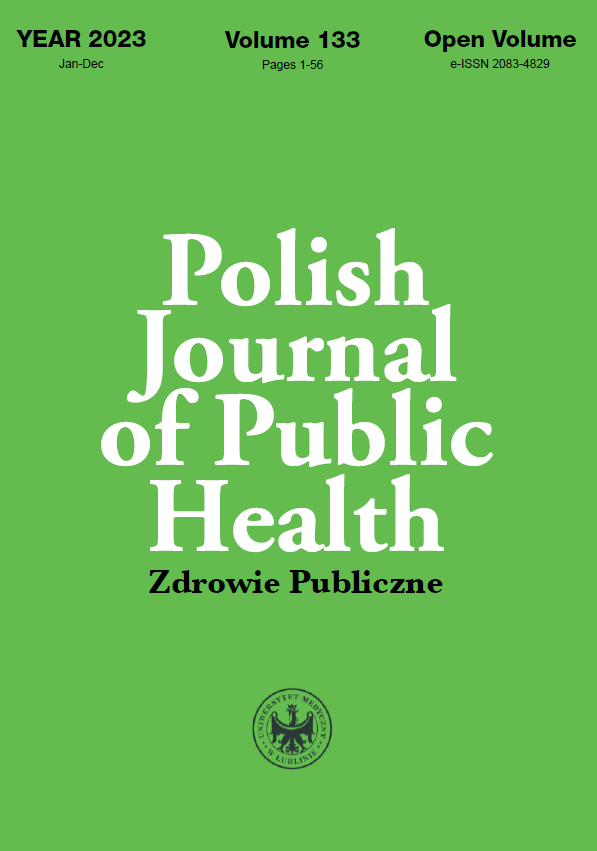Diseases of the digestive system as the cause of disability certificates
DOI:
https://doi.org/10.12923/2083-4829/2023-0002Keywords:
gastrointestinal tract diseases, disability, disability certificateAbstract
Introduction. The incidence of gastrointestinal system neoplasms increases. Colon cancer is one of the most prevalent neoplasms in men and women. Cardiovascular diseases and cancers are among leading causes of death in Poland. Colon cancer and other gastrointestinal diseases (inflammatory, autoimmune, neoplastic), can be causes of disability too.
Aim. The aim of the study was to investigate the characteristics of 16+ population obtaining disability certificates due to gastrointestinal diseases in Lublin within the last 16 years.
Material and methods. The data from the years 2006-2021 were obtained from the Municipal Disability Adjudication Council in Lublin.
Results. In the years 2006-2021 Municipal Disability Adjudication Council in Lublin issued 76,581 disability certificates. Out of that number 2861 (3.7%) certificates were issued due to gastrointestinal diseases. In the years 2006-2012 mainly moderate degree disability was diagnosed. Since 2013 most of the 16+ patients have been diagnosed with severe disability. Majority of patients were unemployed men with vocational education.
Conclusions. Gastrointestinal tract diseases are in eighth the place among the causes of disability certificates in Lublin. The main cause of disability are musculoskeletal diseases.
More effective screening programs are necessary to prevent avoidable disability due to gastrointestinal diseases.
References
1. World Health Organization. WHO policy on disability; 2021.
2. Drabarz A. Aksjologiczne o prawne aspekty niepełnosprawności. Temida 2: Białystok; 2020.
3. World Health Organization WHO. [https://www.who.int/news-room/factsheets/detail/disability-and-health] (access: 16.03.2023)
4. Nieradko-Iwanicka B, Witkowska-Zimny M, Iwanicki J. Musculoskeletal diseases as the basis for disability certificates in Lublin (Poland) in 20062021. Rheumatology. 2022;60(6):376-83.
5. Paradowska-Stankiewicz I, Rosińska M, Wojtyniak B, Zieliński A. Epidemiologia od teorii do praktyki. PZWL: Warszawa; 2021.
6. Krajowy Rejestr Nowotworów. [https://onkologia.org.pl/pl/raporty] (access: 16.03.2023).
7. Ciałkowska-Rysz A, De Walden-Gałuszko K. Medycyna paliatywna. PZWL: Warszawa; 2023.
8. Szczeklik A. Interna Szczeklika. Medycyna Praktyczna: Warszawa; 2022.
9. Art. 4 of the Act of 27 August 1997 on vocational and social rehabilitation and employment of the disabled. Journal of Laws 1997, no. 2021.573.
10. §16 of the Regulation of the Minister of Economy, Labor and Social Policy of 15 July 2003 on the ruling on disability and the degree of disability. Journal of Laws 2021.857.
11. Art. 6b sec. 3 of the Act of 27 August 1997 on vocational and social rehabilitation and employment of disabled persons. Journal of Laws No. 2021.573
12. Potemski P, Polkowski W. Nowotwory układu pokarmowego. Zalecenia PTO; 2015.
13. Daniluk J, Dąbrowski A. Choroby przewodu pokarmowego – postępy 2021/2022 (cz.2). Med Prakt. 2022;10:43-53.
14. Niezgódka-Klósak A, Eder P. Dieta w nieswoistych chorobach zapalnych jelit. Omówienie wskazówek. International Organization for the Study of Inflammatory Bowel Disease 2020. Med Prakt. 2021;11:58-65.
15. Reber E, Gomes F, Vasiloglou MF, Schuetz P, Stanga Z. Nutritional risk screening and assessment. J Clin Med. 2019;8(7):1065.
Downloads
Published
Issue
Section
License
Copyright (c) 2023 Authors

This work is licensed under a Creative Commons Attribution-NonCommercial-NoDerivatives 3.0 Unported License.


